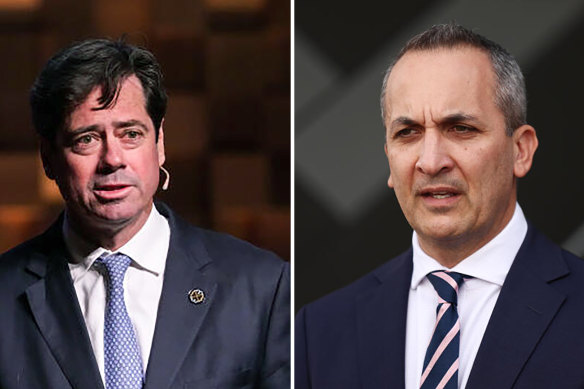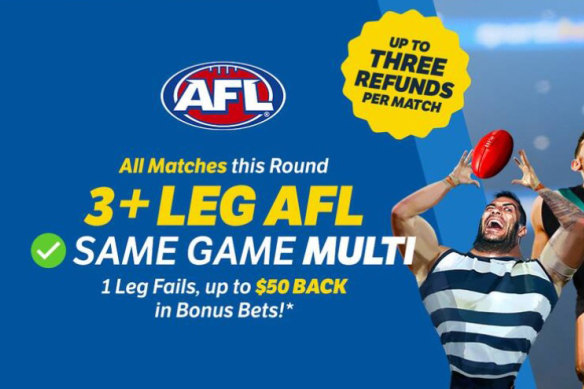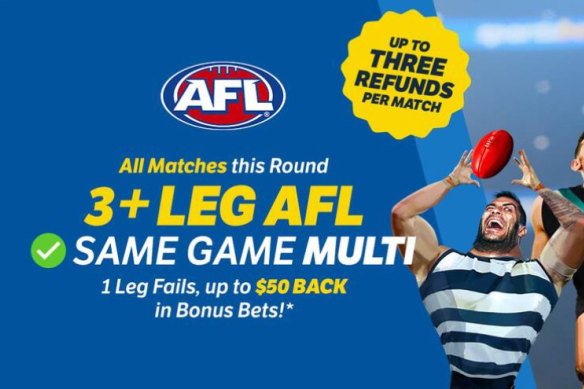Australian sporting chiefs have warned grassroots sports will suffer if revenue from gambling advertising is cut, downplaying concerns over the number of ads targeting sports fans at a parliamentary inquiry into online betting in Canberra.
NRL chief executive Andrew Abdo, who appeared with AFL chief executive Gil McLachlan at the parliamentary inquiry on Tuesday, said his competition had received more than 70,000 pieces of fan feedback over the past five years, and only about 1 per cent of which was related to gambling.

AFL boss Gil McLachlan and NRL chief executive Andrew Abdo.Credit:Nine Publishing
“I am cognisant of the issue, but I’m also cognisant of the fact that the overarching majority of fans do not see this as a major issue,” he said.
Abdo’s comments prompted a rebuke from Labor MP and inquiry chair Peta Murphy, who cited academic studies and fan surveys that showed widespread frustration with the prevalence of gambling culture in sport.
“If you’re relying on the fact that you haven’t had many letters, that’s not very scientifically rigorous,” she said. “I don’t think we could accept that your fans are not particularly concerned about gambling advertising.”
Abdo and McLachlan said they would be open to a conversation about new curbs, particularly regarding inducement advertising – which makes up about one third of gambling advertisements.
“Brand marketing is very different to tactical, or these inducements, they’re just not all the same,” McLachlan said. “The inducements particularly are on social [media] and coming up on your phones … that’s where I’d be targeting the focus because that’s where you’ll get bang for your buck.”

Gambling advertisements are synonymous with major live sports events.
McLachlan, who said the AFL receives a share of the betting outlay on each match, admitted there may be too much promotion of inducements, but could not give an answer on what he thought was an appropriate level of gambling advertisements in sport.
He suggested gambling culture was only a problem insofar as it led to addiction. He told the hearing the AFL aimed for gambling to “not be too pervasive and too in your face”.
“Whether we meet a balance or not is fair debate,” he said.
“Social and media and digital has to be a priority in this … People are looking to broadcast television at 8.30pm… That’s not where the kids are these days.”
Both sports administrators said a ban on gambling ads, which some anti-gambling advocates are pushing for, would cripple sports that receive tens of millions of dollars from offshore sports betting firms.
“I do believe you can actually address community concerns by mitigating the impact on non-for-profit organisations. The extent of the net loss on the AFL [if gambling advertisements were removed] would depend on the capacity of the AFL to attract other sponsors,” McLachlan said, before adding he didn’t think this would be likely.
Abdo and McLachlan warned punters would move to illegal online betting markets or underground markets if legal betting was more heavily restricted, prompting Murphy to caution them against raising consequences that were “not necessarily realistic and looking for a bogeyman”.
The chief executives of the two largest wagering companies – Tabcorp and Sportsbet – also gave evidence on Tuesday, while Entain, the owner of Ladbrokes and Neds, sent its chief of safer gambling Steven Lang rather than chief executive Dean Shannon to advocate for the group.
Industry sources were surprised at the lack of movement from Sportsbet, which has a national agreement with the NRL and the AFL, in light of the wave of consumer sentiment supporting further restrictions on advertising since submissions opened in November. In a shift from its earlier submission to the inquiry, Entain did publicly acknowledge the current advertising regulations were not sufficient but fell short of proposing alternatives.
“There’s no place in our industry for any advertising (that) targets children. We don’t do any advertising that is designed to do that, but we certainly accept the current rules have resulted in some unintended children to gambling advertising,” Lang said.
The representatives from Sportsbet and Entain as well as Responsible Wagering Australia’s chair Nick Minchin all told the inquiry a suggestion by Tabcorp to introduce a national regulator was unnecessary and also said a mandated betting deposit limit across all wagering platforms would do more harm than good.
As it stands, offering consumers a deposit limit is already embedded in the national consumer protection framework, but the individual can set their own limit.
“Setting a limit that’s appropriate to everyone is going to be almost impossible. There’ll be some people for whom their level of affordability is much, much greater than that and there’s also those who won’t be able to sustain that spend,” Lang said.
Sportsbet chief Barni Evans became unstuck after being repeatedly asked by Murphy on whether the bookmaker prevents those on winning streaks from continuing to bet, and apologised if his demeanour appeared defensive at the end of his session.
Industry sources said the wagering groups were surprised at the focus on excluding winning-streak gamblers at the inquiry. Tabcorp told the inquiry it did not exclude punters on any basis, while Entain and Sportsbet said the measure was only applied to those privy to insider information.
“It’s not necessarily the greatest look for companies to stop people winning but not stop people losing,” Murphy told Minchin after he was asked about the practice.
Minchin then contradicted his members and said those on winning streaks should not be excluded from betting.
The Business Briefing newsletter delivers major stories, exclusive coverage and expert opinion. Sign up to get it every weekday morning.
